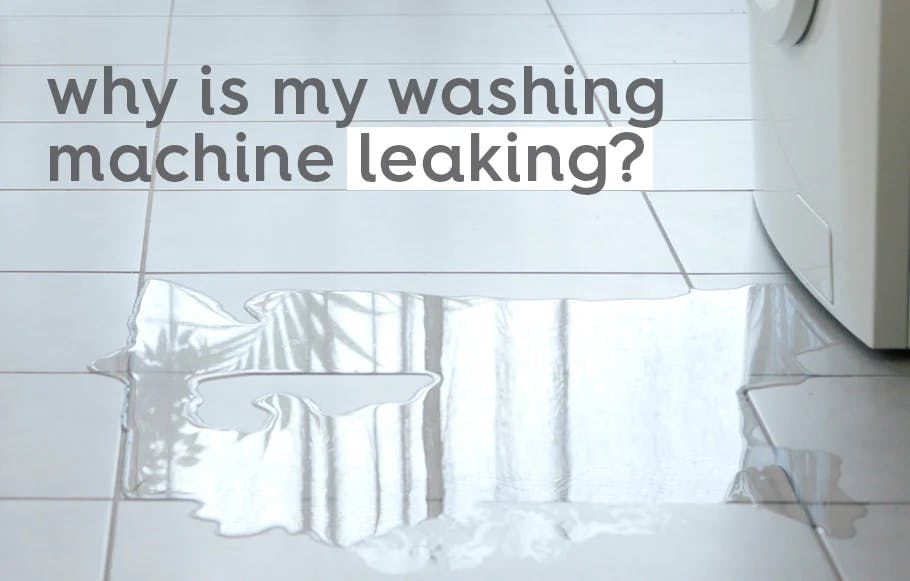03 Nov 2023
Nobody wants a puddle on the floor! - and when it’s in front of your washing machine it’s alarming… but it doesn’t need to spell the end of your machine.
So, once you’ve mopped up the flood, let’s run through the most common leaks your machine could be faced with and discover their causes and (where possible) some solutions.
BUT REMEMBER… before you start investigating your leaky machine, it’s vital to prevent any electrical hazards (along with further floods).
- Turn off your machine at the control panel.
- Unplug the machine from your wall socket.
- Switch all water valves to the "off" position.
leaking from the front.
A puddle on the floor in front of your machine could be caused by an issue around the door.
dirty gasket.
The rubber door seal around the entrance to the machine drum is known as a gasket and its job is to stop water from leaking out of the door during the wash cycle. If the gasket has a build up of dirt and detergent it can struggle to form a seal around the door… and that can lead to leaks.
Clean your gasket regularly (especially around the edges) and always look out for holes or foreign objects.
wonky door.
If your machine door is not closing properly then that’s also going to cause a leak. Sometimes the door hinges become loose over time - if this is the case consult your manual to readjust them and correct the door alignment.
leaking from the back.
If you’ve found water that seems to be coming from out the back of your machine then it’s often either the hoses or the overflow:
hose down.
Waste water hoses that carry the dirty water away from your machine can leak if they are not fully inserted into the standpipe or if they become blocked. Check if the pipe is clogged with undissolved detergent or foreign objects and then ensure it is properly fitted into the drainpipe.
If the fill hoses are loose this will also pose a risk of leaking. If you suspect the leak is coming from a poorly connected fill hose, turn off the water and remove the hose. Check the rubber washers are intact and replace them if necessary. If the fill hoses are still leaking after this there could be a tiny hole somewhere… you may need to replace the hose.
sud off.
Having too many bubbles in a wash can also cause a machine to leak. It prevents the machine from draining effectively and the overflow will become full.
Many detergent manufacturers add foaming fillers to their formulations because customers still feel more bubbles = more cleaning. That’s NOT the case with a laundry detergent however. Surfactant molecules are responsible for the clean and NOT the amount of suds.
Luckily, smol laundry capsules are a high efficiency, low sudsing detergent and recommended for most modern day HE machines that use less water and need less foam!
leaking from underneath.
If you can’t see water dripping from the front or the back then the leak could be coming from underneath your machine.
drum damage.
If the drum sealant is damaged (from the constant shoving of large laundry loads into the drum), or has simply just deteriorated over time, then leaks can occur. Water can run down inside the machine and pool underneath on the floor.
drain pump.
If the drain pump is cracked or damaged, or the bearings are worn out, then the drain pump on your machine may be the cause of your water leak. Unfortunately, the drain pump is not repairable and will need to be replaced.
on the level.
Sometimes a leak can be caused by an unlevel machine. Being unlevel means the fill sensors, valves, and drain hoses cannot function properly. Find that spirit level and check your machine!
the perfect load.
A quick word about overfilling!
Overloading your machine can damage the drum, the door and the door latch, causing water to leak out. Don’t do it! Check out our handy guide to the perfect load here.
Overfilling can also cause your machine to become unbalanced. This can lead to the drum dislodging allowing water to leak out all over the floor.
worth fixing?
If your machine is young and replacement parts can be easily found then it’s a good idea to try and fix your machine if the leak is small. You’ll often save money this way.
However, if your machine is an older model it can sometimes be more cost-effective to replace it.
If in doubt, consult a machine engineer and always remember the safety points below when investigating machine leaks.
- Turn off your machine at the control panel.
- Unplug the machine from your wall socket.
- Switch all water valves to the "off" position.
